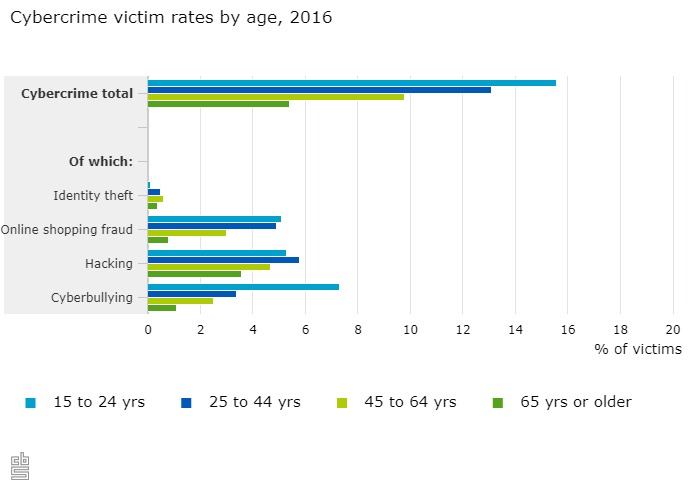As we use the internet and social media on a daily basis, we are more and more exposed to cybercrime; 20% of residents were a victim of cyberbullying in the Netherlands in 2017. One of the most common occurrences of such crime is cyberbullying.
Cyberbullying in the Netherlands
Cyberbullying is a reality even in a safe – or so it’s perceived – place like the Netherlands. The most affected age group, as shown in a report by CBS, includes people between 15 and 24 years old, and the frequency decreases with age:

Young people are the most active internet users, so the fact that they are more frequently a victim of cybercrime doesn’t come as a surprise. There is no reported difference in the rates of cyberbullying between people with higher and lower education, or between rural and urban residents: online harassment mainly happens on social media platforms, equally accessible to all these people.
Somebody bullied me online; now what?
I, unfortunately, witnessed some people being bullied online – maybe not coincidentally, the victim was female and foreigner.
The first instinct might be that of exposing publicly the person and their behavior (e.g. by posting a screenshot of their private message in a group or even sending it to their contacts). The legality of such an outing – or doxxing – especially if to strangers whose actions you can’t control, is yet to be determined (most likely on a case-to-case basis by the judge): the law is slow at adapting to new technologies. Thus, threading cautiously is probably the smartest choice, also given the very real threat of retaliation.
However, this doesn’t mean that you shouldn’t: 1) block this person 2) report them to the admin if the harassment has occurred in a group.
Report cybercrime and online discrimination
One sure (and safe) way of fighting online crime and harassment is to report it to the competent institutions. For the Netherlands, in instances of discriminating statements towards a group of people, it is possible to report to the internet discrimination hotline (MiND Nederland): If MiND believes that a particular statement is unlawful, it issues a request for the removal of that statement.
In more personal cases, it is always a good idea to contact the police. As described in a quite clear review about Cybercrime Legislation in the Netherlands, many forms of online harassment (cyberstalking, for example) fall under the same punishment as their real-life counterparts!
Did you experience online harassment / cyberbullying in the Netherlands? Let us know in the comments!
Cover pic source: Pixabay



I live in canada, and for years i have been billed by a resident of the Netherlands, she have made munber of videos, which she post on social media, including fb, and YouTube. Because of her actions my family in jamaica is living in constant fear for their lives… i would like to get incontact with the relivant authorities in the Netherlands, so this can be stop
Hello Lenworth Cover,
As the article suggests, please issue a report with the Dutch police regarding this matter. For more information on how to do this, please visit https://www.politie.nl/en
You can read various information and how to proceed on:
https://www.politie.nl/en/themes/are-you-the-victim-of-a-crime-kopie.html
Kind regards,
Hello, My ldr boyfriend threatens me on so many ways that he will create a fake facebook account and upload my nude photos and videos and will leaked it in the internet. I am in another country and he is Netherlands.